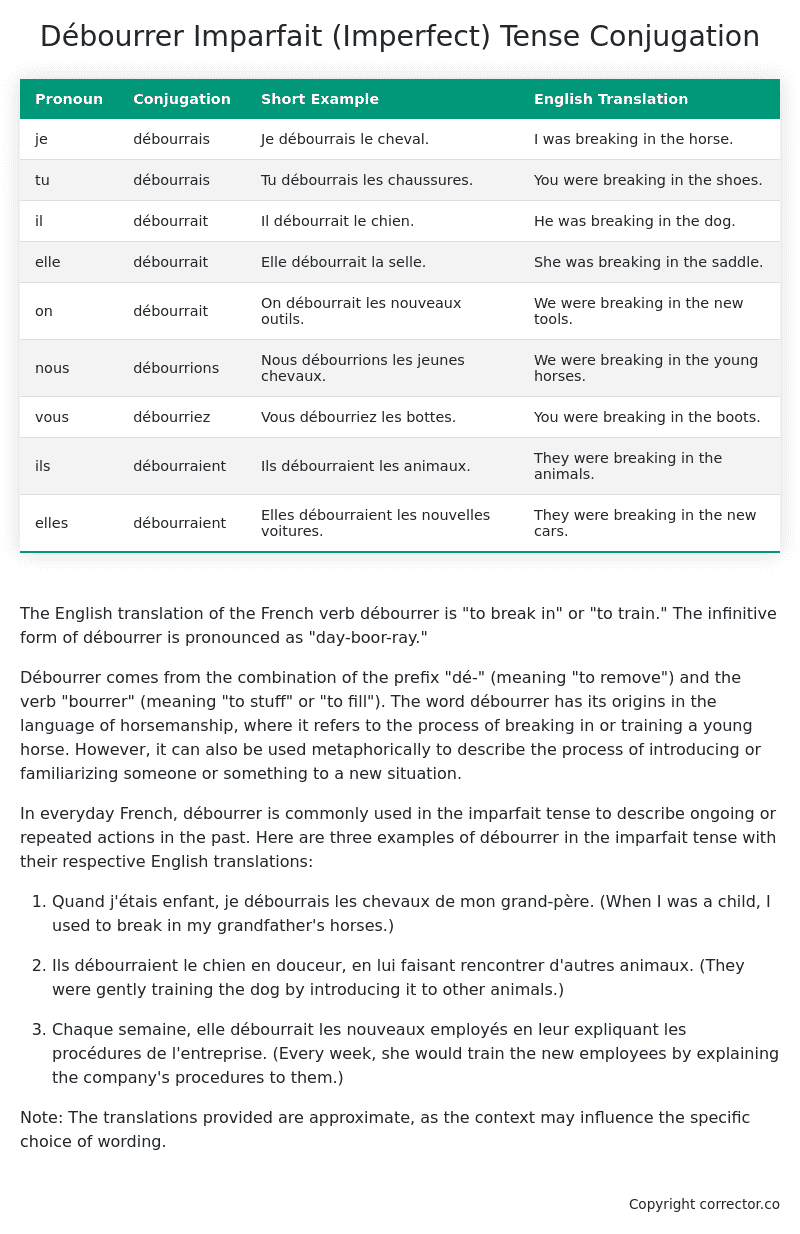Imparfait (Imperfect) Tense Conjugation of the French Verb débourrer
Introduction to the verb débourrer
The English translation of the French verb débourrer is “to break in” or “to train.” The infinitive form of débourrer is pronounced as “day-boor-ray.”
Débourrer comes from the combination of the prefix “dé-” (meaning “to remove”) and the verb “bourrer” (meaning “to stuff” or “to fill”). The word débourrer has its origins in the language of horsemanship, where it refers to the process of breaking in or training a young horse. However, it can also be used metaphorically to describe the process of introducing or familiarizing someone or something to a new situation.
In everyday French, débourrer is commonly used in the imparfait tense to describe ongoing or repeated actions in the past. Here are three examples of débourrer in the imparfait tense with their respective English translations:
-
Quand j’étais enfant, je débourrais les chevaux de mon grand-père.
(When I was a child, I used to break in my grandfather’s horses.) -
Ils débourraient le chien en douceur, en lui faisant rencontrer d’autres animaux.
(They were gently training the dog by introducing it to other animals.) -
Chaque semaine, elle débourrait les nouveaux employés en leur expliquant les procédures de l’entreprise.
(Every week, she would train the new employees by explaining the company’s procedures to them.)
Note: The translations provided are approximate, as the context may influence the specific choice of wording.
Table of the Imparfait (Imperfect) Tense Conjugation of débourrer
| Pronoun | Conjugation | Short Example | English Translation |
|---|---|---|---|
| je | débourrais | Je débourrais le cheval. | I was breaking in the horse. |
| tu | débourrais | Tu débourrais les chaussures. | You were breaking in the shoes. |
| il | débourrait | Il débourrait le chien. | He was breaking in the dog. |
| elle | débourrait | Elle débourrait la selle. | She was breaking in the saddle. |
| on | débourrait | On débourrait les nouveaux outils. | We were breaking in the new tools. |
| nous | débourrions | Nous débourrions les jeunes chevaux. | We were breaking in the young horses. |
| vous | débourriez | Vous débourriez les bottes. | You were breaking in the boots. |
| ils | débourraient | Ils débourraient les animaux. | They were breaking in the animals. |
| elles | débourraient | Elles débourraient les nouvelles voitures. | They were breaking in the new cars. |
Other Conjugations for Débourrer.
Le Present (Present Tense) Conjugation of the French Verb débourrer
Imparfait (Imperfect) Tense Conjugation of the French Verb débourrer (You’re reading it right now!)
Passé Simple (Simple Past) Tense Conjugation of the French Verb débourrer
Passé Composé (Present Perfect) Tense Conjugation of the French Verb débourrer
Futur Simple (Simple Future) Tense Conjugation of the French Verb débourrer
Futur Proche (Near Future) Tense Conjugation of the French Verb débourrer
Plus-que-parfait (Pluperfect) Tense Conjugation of the French Verb débourrer
Passé Antérieur (Past Anterior) Tense Conjugation of the French Verb débourrer
Futur Antérieur (Future Anterior) Tense Conjugation of the French Verb débourrer
Subjonctif Présent (Subjunctive Present) Tense Conjugation of the French Verb débourrer
Subjonctif Passé (Subjunctive Past) Tense Conjugation of the French Verb débourrer
Subjonctif Imparfait (Subjunctive Imperfect) Tense Conjugation of the French Verb débourrer
Subjonctif Plus-que-parfait (Subjunctive Pluperfect) Tense Conjugation of the French Verb débourrer
Conditionnel Présent (Conditional Present) Tense Conjugation of the French Verb débourrer
Conditionnel Passé (Conditional Past) Tense Conjugation of the French Verb débourrer
Conditionnel Passé II (Conditional Past II) Tense Conjugation of the French Verb débourrer
L’impératif Présent (Imperative Present) Tense Conjugation of the French Verb débourrer
L’impératif Passé (Imperative Past) Tense Conjugation of the French Verb débourrer
L’infinitif Présent (Infinitive Present) Tense Conjugation of the French Verb débourrer
L’infinitif Passé (Infinitive Past) Tense Conjugation of the French Verb débourrer
Le Participe Présent (Present Participle) Tense Conjugation of the French Verb débourrer
Le Participe Passé (Past Participle) Tense Conjugation of the French Verb débourrer
Struggling with French verbs or the language in general? Why not use our free French Grammar Checker – no registration required!
Get a FREE Download Study Sheet of this Conjugation 🔥
Simply right click the image below, click “save image” and get your free reference for the débourrer imparfait tense conjugation!

Débourrer – About the French Imparfait Tense
NOTE: To take a deep dive into all the French tenses then see our article on Mastering French Tense Conjugation.
Formation of the Imparfait Tense
For regular -er verbs:
For regular -ir verbs
For regular -re verbs
Common Everyday Usage Patterns
Description of Past Habits
Background Information
Mental and Emotional States
It’s employed to express emotions, thoughts, or physical sensations in the past. For example: “J’étais content quand il est arrivé.” (I was happy when he arrived.)
Ongoing Actions
Points to Note About the Imparfait Tense
Passé Composé vs. Imparfait
Conditional
Si Clauses
Narration
I hope you enjoyed this article on the verb débourrer. Still in a learning mood? Check out another TOTALLY random French verb imparfait conjugation!


